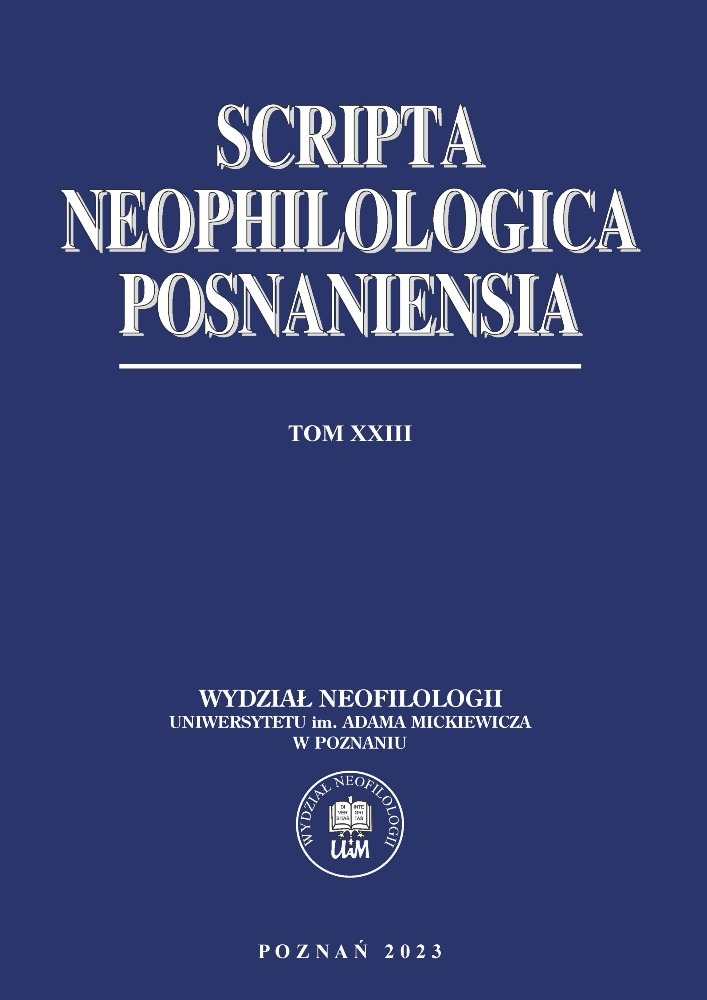Abstract
The anthropic principle, which emphasizes the role of the human observer in the observation of the universe, is accepted here as the fundamental principle operating within the ‘human condition’ (conditio humana, CH). A four-step model of CH is postulated here. The model comprises a synergy of the following steps/degrees: sensing, the anthropic principle, language, and sources of natural language feeding/strengthening. The model is assumed to be relevant in the description and assessment of the following components of the ecological approach to natural language: natural language resources, natural language resource management, communicative wellbeing, degree of conservation of natural language resources in a particular natural language habitat, and ecological support for the life of natural language.
References
Berlin, B. (1992). Ethnobiological classification: principles of categorization of plants and animals in traditional societies. Princeton, N.J.: Princeton University Press. DOI: https://doi.org/10.1515/9781400862597
Cardona, G. (1976/1997). Panini: a survey of research. Delhi: Motilal Banarsidass Publishers Private Limited. DOI: https://doi.org/10.1515/9783110800104
Castetter, E.F. (1944). “The domain of ethnobiology”, The American Naturalist 78.774, 158-170. Cotton, C.M. (1996). Ethnobotany: principles and applications. New York: John Wiley and Sons. DOI: https://doi.org/10.1086/281182
Cranefield, P.F. (1970). „On the origin of the phrase nihil est in intellectu quod non prius fuerit in sensu”. Journal of the History of Medicine and Allied Sciences 25, 77-80. DOI: https://doi.org/10.1093/jhmas/XXV.1.77
Eberhard, D.M., G.F. Simons i C.F. Fennig. (red.). (2023). Ethnologue: languages of the world. Wyd. 26. Dallas, TX: SIL International.
Gibson, J.J. (1966). The senses considered as perceptual systems. Boston: Houghton Mifflin.
Gołąb, Z., A. Heinz i K. Polański. (1968). Słownik terminologii językoznawczej. Warszawa: PWN. Hetherrington, N.S. (red.). (1993/2014). Encyclopedia of cosmology (Routledge revivals): historical, philosophical, and scientific foundations of modern cosmology. London: Routledge Chapman Hall.
Hoffman, D.D. (2009). „The interface theory of perception: natural selection drives true perception to swift extinction”. W: Dickinson, S., M. Tarr, A. Leonardis i B. Schiele. (red.). Object categorization: computer and human vision perspectives. 148-265. Cambridge: Cambridge University Press. DOI: https://doi.org/10.1017/CBO9780511635465.009
Hoffman, D.D. (2019). The case against reality: why evolution hid the truth from our eyes. New York: W.W. Norton.
Hoskin, M. (1996). The Cambridge illustrated history of astronomy. Cambridge: Cambridge University Press.
Hunn, E. (2007). „Ethnobiology in four phases”. Journal of Ethnobiology 27(1), 1-10. DOI: https://doi.org/10.2993/0278-0771(2007)27[1:EIFP]2.0.CO;2
Kosko, B. (1990). „Fuzziness vs probability”. International Journal of General Systems 17, 211-240. Krebs, C. (2008). Ecology: the experimental analysis of distribution and abundance. Boston: Addison Wesley. DOI: https://doi.org/10.1080/03081079008935108
Levi-Strauss, C. (1966). The savage mind. London: Weindenfeld and Nicolson.
Lindley, D.V. (1987). „The probability approach to the treatment of uncertainty in artificial intelligence and expert systems”. Statistical Science 2(1), 17-24. DOI: https://doi.org/10.1214/ss/1177013427
Lockwood, D.G. (1972). Introduction to stratificational linguistics. New York: Harcourt, Brace, Jovanovich.
Maoz, D. (2016). Astrophysics in a nutshell. Princeton, N.J.: Princeton University Press. Mejor, M. (2000/2004). Sanskryt. Warszawa: Wydawnictwo Akademickie Dialog.
Ottenheimer, H.J. (2009). The anthropology of language: an introduction to linguistic anthropology. Belmont, CA: Wadsworth Cengage Learning.
Puppel, S. (2022). Habent sua fata linguae (czyli szkic o tym, że wszyscy mamy język, że ‘mieszkamy’ w nim i co się z nim dzieje). Scripta de Communicatione Posnaniensi. Tom X: Prace Naukowe Zakładu Ekolingwistyki i Komunikologii UAM. Poznań.
Sapir, E. (1985). Selected writings in language, culture and personality. Berkeley and Los Angeles: University of California Press.
Schacter, D.L., D.T. Gilbert i D.M. Wegner. (2011). Psychology. New York: Worth Publishing.
Whorf, B.L. (1956). Language, thought, and reality. Selected writings of Benjamin Lee Whorf (edited by J.B. Carroll). Cambridge, Mass.: The MIT Press.
Wierzbicka, A. (1992). Semantics, culture and cognition: universal human concepts in culture- specific configurations. Oxford: Oxford University Press. DOI: https://doi.org/10.1093/oso/9780195073256.001.0001
Zadeh, L.A. (1965). „Fuzzy sets”. Information and Control 8, 338-353. DOI: https://doi.org/10.1016/S0019-9958(65)90241-X
License
Copyright (c) 2023 Stanisław Puppel

This work is licensed under a Creative Commons Attribution-NoDerivatives 4.0 International License.

